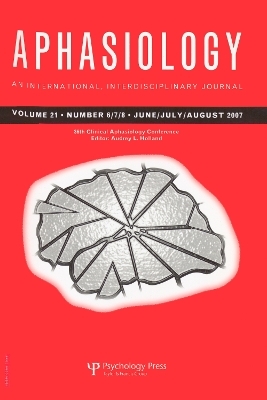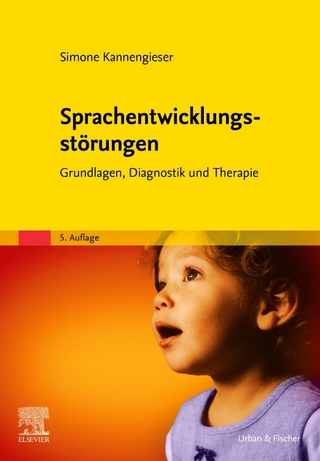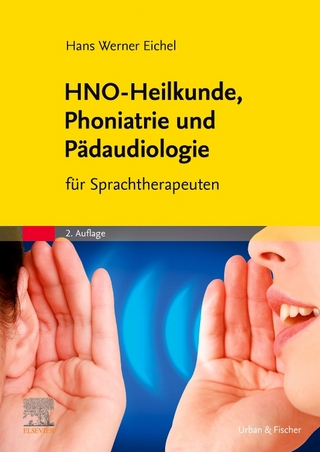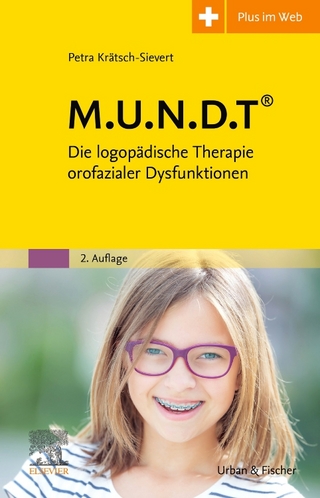
36th Clinical Aphasiology Conference
Psychology Press Ltd (Verlag)
978-1-84169-828-1 (ISBN)
- Titel z.Zt. nicht lieferbar
- Versandkostenfrei
- Auch auf Rechnung
- Artikel merken
Department of Speech and Hearing Sciences The University of Arizona
A.L. Holland, Introduction. E. Ruigendijk, S. Baauw, Syntactic and Pragmatic Aspects of Determiner and Pronoun Production in Dutch Agrammatic Brocas Aphasia. A. Tissen, S. Weber, M. Grande, T. Gunther, "Tree Pruning Hypothesis" in Bilingualism. J. Reilly, K. Cross, V. Troiani, M. Grossman, Single Word Semantic Judgments in Semantic Dementia: Do Phonology and Grammatical Class Count? N. Friedmann, A. Gvion, As Far As Individuals with Conduction Aphasia Understood These Sentences were Ungrammatical: Garden Path in Conduction Aphasia. S. Corsten, M. Mende, J. Cholewa, W. Huber, Treatment of Input and Output Phonology in Aphasia: A Single Case Study. M. Walsh Dickey, C.K. Thompson, The Relation Between Syntactic and Morphological Recovery in Agrammatic Aphasia: A Case Study. N. Lallini, N. Miller, D. Howard, Influences on Speech Pproduction in Acquired Output Impairment: A Cross-language Comparison. J.L. Wambaugh, S. Wright, Improved Effects of Word-retrieval Treatments Subsequent to Addition of the Orthographic Form. J.K. Gordon, A Contextual Approach to Facilitating Word Retrieval in Agrammatic Aphasia. A. van der Merwe, Self-correction in Apraxia of Speech: The Effect of Treatment. A. Lorenz, L. Nickels, Minor Orthographic Cueing in Anomic Aphasia: How Does it Work? K. Bowes, N. Martin, Longitudinal Study of Reading and Writing Rehabilitation Using a Bigraph-biphone Correspondence Approach. M.C. Duff, J.A. Hengst, D. Tranel, N.J. Cohen, Talking across Time: Using Reported Speech as a Communicative Resource in Amnesia. V.L. Scharp, C.A. Tompkins, J.M. Iverson, Gesture and Aphasia: Helping Hands? A. Bose, L. Buchanan, A Cognitive and Psycholinguistic Investigation of Neologisms. H. Cote, M. Payer, F. Giroux, Y. Joanette, Towards a Description of Clinical Communication Impairment Profiles Following Right-hemisphere Damage. R.C. Marshall, S.R. McGurk, C.M. Karow, T.J. Kairy, Problem Solving by Subjects With and Without Diffuse Neurologic Involvement. E. Armstrong, H. Ulatowska, Making Stories: Evaluative Language and the Aphasia Experience. M.R. McNeil, J. Eun Sung, D. Yang, S.R. Pratt, T.R.D. Fossett, S. Pavelko, P.J. Doyle, Comparing Connected Language Elicitation Procedures in Person with Aphasia: Concurrent Validation of the Story Retell Procedure. C. Croteau, G. Le Dorze, G. Baril, Development of a Procedure to Evaluate the Contributions of Persons with Aphasia and their Spouses in an Interview Situation. H. Harris Wright, R.A. Downey, M. Gravier, T. Love, L.P. Shapiro, Processing Distinct Linguistic Information Types in Working Memory in Aphasia. T. Frankel, C. Penn, D. Ormond-Brown, Executive Dysfunction as an Explanatory Basis for Conversation Symptoms of Aphasia: A Pilot Study.
| Erscheint lt. Verlag | 30.5.2007 |
|---|---|
| Reihe/Serie | Special Issues of Aphasiology |
| Verlagsort | Hove |
| Sprache | englisch |
| Maße | 189 x 246 mm |
| Gewicht | 524 g |
| Themenwelt | Medizin / Pharmazie ► Gesundheitsfachberufe ► Logopädie |
| ISBN-10 | 1-84169-828-8 / 1841698288 |
| ISBN-13 | 978-1-84169-828-1 / 9781841698281 |
| Zustand | Neuware |
| Informationen gemäß Produktsicherheitsverordnung (GPSR) | |
| Haben Sie eine Frage zum Produkt? |
aus dem Bereich


